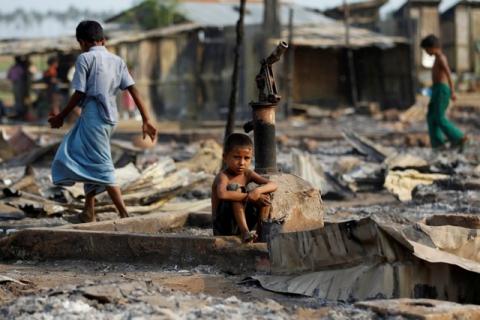Advertisement
Myanmar's Suu Kyi to lead new effort on restive Rakhine State
YANGON (Reuters) - Myanmar's Aung San Suu Kyi will lead a new effort to bring peace and development to Rakhine State where violence between majority Buddhists and minority Muslims in recent years has cast a cloud over progress on democratic reforms.
More than 100 people were killed in violence in the western state in 2012, and some 125,000 Rohingya Muslims, who are stateless, took refuge in camps where their movements are severely restricted.
Thousands have fled persecution and poverty in an exodus by boat to neighboring South and Southeast Asian countries.
Suu Kyi, who holds the office of state counselor, will lead a new Central Committee for Implementation of Peace and Development in Rakhine State, the President's Office said in an online announcement on Tuesday.
The group will consist of 27 officials, including all cabinet ministers.
The announcement, dated Monday, gave only the names of those in the committee and offered no details on how the group would go about addressing the state's multitude of problems.
The minister of border affairs, appointed by the commander-in-chief, and the state's chief minister, a member of Suu Kyi's National League for Democracy party, will both be vice-chairmen of the committee.
Zaw Htay, spokesman at the state counselor's office, said the group would make a research trip to the state "very soon" but did not give a date or say if Suu Kyi be in the delegation.
Suu Kyi campaigned in the south of the state before a November election that her party won, but she avoided the state capital, Sittwe, and has never visited the camps for people displaced in the violence.
Her reluctance to speak out against the Rohingya's plight has been sharply criticized by rights groups.
There is widespread hostility towards Rohingya Muslims in the Buddhist-majority country, including among some within Suu Kyi's party and its supporters.
This month, Suu Kyi said the country needed "enough space" do deal with the issue and cautioned against the use of "emotive terms", that she said were making the situation more difficult.
The term Rohingya is itself contentious, as the group is not one of the country's 135 officially designated ethnic groups.
The previous military-dominated government referred to the group as Bengalis, insinuating that they are illegal immigrants from neighboring Bangladesh.
Nationalist organizations and monks, have denounced people who use the name Rohingya.
In addition to the problems facing the Muslim minority, the state has seen a recent increase in clashes between the army and members of the Arakan Army, a Buddhist-dominated Rakhine nationalist guerrilla group.
(Editing by Timothy Mclaughlin, Robert Birsel)



















Add new comment